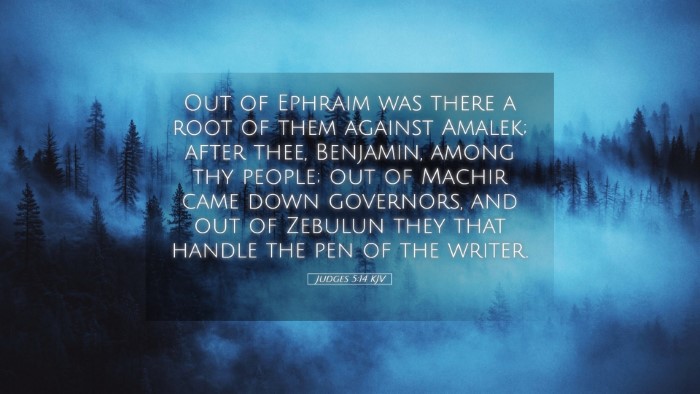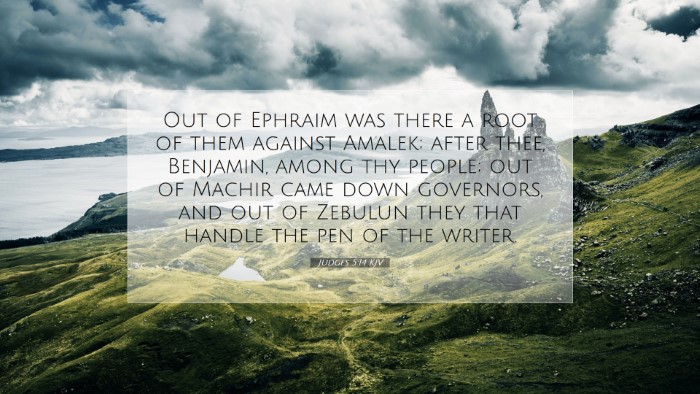Judges 5:14 Commentaries Summary
Judges 5:14 states: "Out of Ephraim was there a root of them against Amalek; after thee, Benjamin, among thy people; out of Machir came down governors, and out of Zebulun they that handle the pen of the writer."
Contextual Analysis
This verse forms part of the Song of Deborah, a poetic recounting of victory over the Canaanite tribes, particularly the forces of Sisera. It reflects on the participation of various tribes in the battle against the oppressive forces of Amalek and the subsequent triumph of the Israelites. This song not only serves as a historical recounting but also as a profound theological reflection on God’s deliverance.
Insights from Commentaries
Matthew Henry
Matthew Henry emphasizes the significance of each tribe’s involvement in the battle, noting that this verse highlights Ephraim as a principal leader against Amalek. Henry points out the metaphorical 'root,' indicating that out of a source—Ephraim—came forth warriors who would engage in battle. He warns that the neglect of one’s duty, particularly among those appointed to lead (like Benjamin), can lead to great judgments. He draws attention to the idea that God ordains leaders to achieve His purposes, and the impact of these leaders extends beyond their immediate context.
Albert Barnes
Albert Barnes provides a more detailed geographical perspective, explaining the tribes referenced in the verse. He remarks that Ephraim, being at the heart of Israel, had ready access to the resources and manpower necessary for battles. Barnes further connects the involvement of Benjamin and Machir, recognizing that each tribe contributed uniquely to the war effort, whether through battle or by providing wise governance. The mention of Zebulun, particularly those who “handle the pen of the writer,” suggests the importance of communication and recording history—a theme that resonates deeply with the role of scripture in remembrance and teaching.
Adam Clarke
Adam Clarke's commentary focuses on the characteristics of the tribes involved. He highlights that Machir, representing a more noble lineage, showcases the importance of noble character in leadership roles. Clarke also notes the cultural significance of Zebulun's mention—as artisans, scribes, or perhaps individuals responsible for disseminating knowledge. This underscores the essential role of education, wisdom, and communication in the life of the Israelite community, especially during moments of national crisis.
Theological Reflections
The participation of various tribes in Judges 5:14 serves as an important theological reflection on God's sovereign plan. The diverse contributions from Ephraim, Benjamin, Machir, and Zebulun illustrate that God calls individuals and groups from all backgrounds to partake in His work, rallying them for a common purpose. Furthermore, the verse underscores that every role—be it that of a warrior, leader, or scribe—holds value in the fulfillment of God's mission.
Lessons for Modern Application
- The Importance of Community: Just as the tribes unified for a common cause, modern Christians are called to work together within the Church, bringing their unique gifts and resources to the table.
- Leadership and Responsibility: Leaders must recognize their roles within their communities and strive to lead with integrity, ensuring they fulfill their God-given duties effectively.
- Communication as a Tool for Ministry: The reference to those handling the pen underscores the necessity of clear and effective communication in sharing the message of God, both in teaching and in the recording of history for future generations.
- God's Sovereignty in Diversity: The verse exemplifies how God utilizes diverse groups for His glory and purposes, thereby encouraging individuals not to underestimate their potential contributions to His work.
Conclusion
Judges 5:14 is not merely a historical recount; it represents a rich tapestry of theology, leadership, and divine orchestration. As we consider the various roles that the tribes played, we are reminded of our roles within the body of Christ today. Through insights from Henry, Barnes, and Clarke, we gain a profound understanding of the importance of unity, the value of diverse contributions, and the overarching sovereignty of God in accomplishing His redemptive purposes.


